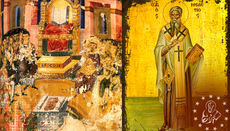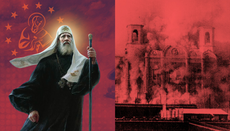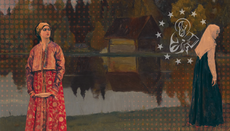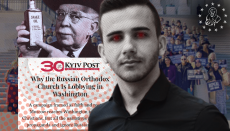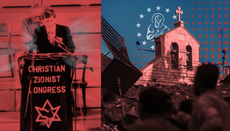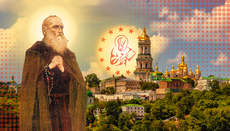Jay Dyer's Reading List
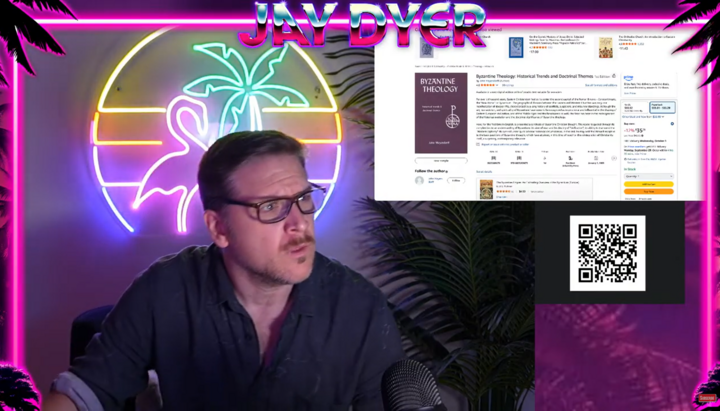
During a recent stream, Jay Dyer gave a list of books he recommends to folks who are inquiring into Orthodoxy. We thought it would be helpful to collect the list here and break them down by category: For Catholics, for Protestants, for all Western Christians, Orthodox Theology, and Patristics. Thanks to Jay for the great recommendations.
For Catholics
Two Paths by Michael Welton
Explores Western Christianity’s divergence from Holy Orthodoxy, highlighting their theological and cultural distinctions. Welton examines how historical developments shaped these paths, offering insights into their unique approaches to faith, worship, and salvation.
Church, Papacy, Schism by Philip Sherrard
Sherrard critiques the papacy’s role in the divide, emphasizing differing views on authority and doctrine. A compelling study of ecclesiastical division. Dyer says he appreciates Sherrard’s “philosophical, historical, and metaphysical critiques” of Roman Catholicism, and the papacy in particular.
The Errors of the Latins by George Pachymeres
A two-volume work detailing perceived theological and liturgical deviations of the Western Church from Orthodox tradition. It critiques a range of Latin dogmas and practices, from the Filioque to the Stigmata. A foundational text for understanding how the gulf between Catholicism and Orthodoxy has continued to widen since the Great Schism.
For Protestants
On the Unity of Christ by St. Cyril of Alexandria
A 5th-century defense of Christ’s single divine-human hypostasis against Nestorianism. Cyril’s theological precision underscores the unity of Christ’s person, a cornerstone of Orthodox Christology. A strong refutation of Calvinism.
The Christological Controversy by John Anthony McGuckin
A scholarly analysis of early Christian debates over Christ’s nature. McGuckin examines key controversies, figures, and councils, providing a clear historical and theological overview for understanding Orthodox Christology.
On the Holy Icons by St. Theodore the Studite
A robust defense of icon veneration during the Iconoclastic Controversy. Theodore articulates the theological significance of icons, emphasizing their role in Orthodox worship and devotion. Good for Evangelicals and others who have reservation about the use and veneration of icons.
Defense of Holy Images by St. John of Damascus
A foundational 8th-century apology for icon veneration. John argues that icons are windows to the divine, countering iconoclasm with theological and scriptural clarity, essential for Orthodox liturgy.
The Formation of the Biblical Canon by Lee Martin McDonald
A detailed study of how the Christian biblical canon was formed. McDonald explores historical, cultural, and theological factors shaping the Old and New Testaments, ideal for understanding scriptural development. Though the author is Protestant, he admits the central role that Ecumenical Councils (i.e., ecclesial authority) and Patristics (i.e., tradition) played in the formation of the biblical canon.
The Canon of Scripture by F.F. Bruce
A scholarly examination of the Bible’s canonization process. Bruce traces the historical and theological criteria for including texts in the Christian canon, offering a clear, authoritative resource for biblical studies. Dyer sees this, too, as a Protestant text which affirms the Orthodox narrative on the compilation of Scripture.
For All "Western Christians"
The Mystagogy of the Holy Spirit by St. Photios
A seminal 9th-century work by St. Photios defending the Orthodox position on the Holy Spirit’s procession. It refutes the Filioque clause, emphasizing the Spirit’s origin from the Father alone. Essential to understanding Orthodoxy’s strong rejection of the Latin Church’s modification of the Creed.
On the Procession of the Holy Spirit by St. Gregory Palamas
A more challenging theological treatise defending the Orthodox view of the Holy Spirit’s procession against Western innovations. Palamas employs rigorous arguments, blending mystical and dogmatic theology. Dyer recommends reading after Photios.
Crisis in Byzantium by Aristeides Papadakis
Chronicles the 14th-century Byzantine Empire’s theological and political turmoil, focusing on the Hesychast controversy. It explores St. Gregory Palamas’s role in defending Orthodoxy against Western influences, offering a vivid account of a pivotal moment in Byzantine religious history.
Orthodoxy and the Religion of the Future by Seraphim Rose
According to Dyer, this is a good book for those looking to “branch out” beyond catechetical and theological material. Critiques modern spiritual trends (Western Hinduism, the “Charismatic Renewal,” etc.) from an Orthodox perspective, warning against syncretism and secularism.
On Orthodox Theology
The Deification of Man by Georgios Mantzaridis
Examines the Orthodox doctrine of theosis, the transformative process of becoming one with God’s divine nature. Mantzaridis integrates patristic teachings with contemporary insights, offering a clear yet profound exploration of humanity’s ultimate purpose in Orthodox theology.
Mystical Theology of the Eastern Church by Vladimir Lossky
A foundational introduction to Orthodox theology, emphasizing its mystical dimensions. Lossky explores the interplay of divine mystery, human participation, and the Trinity, making it an accessible yet profound entry point for understanding Eastern Christian spirituality.
Greek East, Latin West by Philip Sherrard
A masterful comparative study of Eastern Orthodox and Western Christian theological traditions. Sherrard examines their philosophical and spiritual differences, offering one of the best introductory discussions on the subject. Ideal for readers seeking clarity on East-West Christian dynamics.
Byzantine Theology by John Meyendorff
An authoritative introduction to Orthodox theology, tracing its development in the Byzantine Empire. Meyendorff explores key doctrines, historical contexts, and figures like the Cappadocian Fathers, making it a cornerstone for understanding Orthodox thought and practice.
Orthodox Dogmatic Theology by Michael Pomazansky
A comprehensive guide to Orthodox doctrine, used by FrD. Ananias for online catechesis. Pomazansky systematically covers topics like the Trinity, salvation, and sacraments, blending clarity with depth for students and catechumens seeking a solid theological foundation.
Christianity and Classical Culture by Jaroslav Pelikan
Examines the interplay between early Christianity and Greco-Roman culture. Pelikan explores how classical philosophy shaped Christian theology, particularly through figures like Augustine, offering a scholarly yet accessible study of Christianity’s cultural synthesis.
Orthodox Dogmatic Theology, Volume 1 by Dumitru Stăniloae
A profound exploration of Orthodox theology, focusing on God’s revelation and human salvation. Stăniloae’s work is dense and not recommended for beginners, offering deep insights into the Trinity and divine-human relations for advanced readers.
Church Fathers
On the Incarnation by St. Athanasius
A classic 4th-century treatise defending the divinity of Christ and the necessity of the Incarnation for human salvation. Athanasius’s clear, powerful arguments make this a foundational text for understanding core Christian doctrines in Orthodoxy.
Ad Gentes by St. Athanasius
A lesser-known work attributed to Athanasius, focusing on missionary efforts to spread Christianity. It emphasizes the universal call to salvation and the Church’s role in evangelizing diverse cultures, reflecting early Christian outreach.
Five Theological Orations by St. Gregory of Nazianzus
A series of eloquent sermons defending Trinitarian theology against Arianism. Gregory’s orations articulate the divinity of Christ and the Holy Spirit, blending rhetorical brilliance with theological depth, essential for understanding Orthodox Christology.
On the Holy Spirit by St. Basil the Great
A 4th-century masterpiece defending the divinity of the Holy Spirit within the Trinity. Basil’s rigorous arguments and scriptural exegesis solidify the Orthodox doctrine of the Spirit’s consubstantiality with the Father and Son.
Catechetical Lectures by St. Cyril of Jerusalem
A series of 4th-century lectures for catechumens, introducing core Christian beliefs and sacraments. Cyril’s clear, pastoral style makes this an accessible guide for those preparing for baptism in the Orthodox tradition.
On the Cosmic Mystery of Jesus Christ by St. Maximus the Confessor
Explores Christ’s role in uniting creation with the divine. Maximus’s profound reflections on the Incarnation and theosis offer a cosmic vision of salvation, central to Orthodox mystical theology.
On the Orthodox Faith by St. John of Damascus
A comprehensive 8th-century exposition of Orthodox doctrine. John systematically addresses the Trinity, Christology, and sacraments, serving as a definitive guide to Orthodox theology and apologetics.
BONUS
A prayer book
This, as Dyer notes, is essential for those who are serious about understanding Orthodoxy. Jay uses the blue hardcover prayer book from Holy Transfiguration Monastery and has done since 2006.
Jay concludes with this thought:
Remember, in terms of Orthodoxy, all of these things are in the abstract, in the theological realm. Which is necessary, but they're not really going to be about what you're going to find in the next several years of being Orthodox.
Because what's going to happen is, you're going to think it's all these issues that have to be resolved, and then three, four, five, ten years in, you are actually battling your own passions. And that is more important than getting the right books.
You're gonna find how challenging and how difficult battling and defeating your sins and your passions is, vs. having the right Amazon wish list. And your Amazon wish list isn't going to get you into heaven.
Amen!
